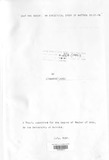| dc.description.abstract | The interpretation of the Scriptures has played an important
role in influencing the Christian way of living, faith and practice.
As the thoughts of the people are always influenced by the
historical situations of the time and place, the interpretation
of the Scriptures also has been nourished by the historical
occurrences in different periods and places. Due to this
influence the truth of the Scriptures has been sometimes ignored
by some Christian interpreters.
One of the crucial areas where the Scriptures have had
influence in Christian faith and action is the teaching of the
last judgement provided in Matthew 26:31-44. According to this
Biblical text, there will be separation of Goats from Sheep in
the last judgement.
Our primary objective in conducting this research was to
find out how the Scriptures influence belief and practice in
Christianity. Therefore, a study on the selected text was done
through employing the various methods of Biblical criticism and
interpretation.
We found that the so called Goats and Sheep are among the
peoples of all nations whic~ will be gathered on the day of
judgement and be judged, condemned or rewarded respectively in
accordance with their good or bad deeds done to their fellow
mankind.
In the implications of the study for Africa, we reached the
conclusion that for Christianity to have any relevance, it must
correctly interpret the Scriptures. That this Scriptures must
be interpreted in a way which can not only deal with Spiritual
matter, but also with social, economic and political issues
affecting most African people who are victims of poverty,
oppression and injustice.
Chapter one introduces the proceedings of the study.
Chapter two, after presenting the methods of the interpretation
of the Scriptures and the conditions of Israel's people in the
time of Jesus Christ's life and ministry, deals with the
interpretation of the selected text. Chapter three presents the
theological implication of the study in general and in the
African context in particular. Chapter four discusses the study
in its relation to the theology of liberation or Christians'
duty in the liberation of the oppressed.
We conclude our study with recommendations. The major
recommendation derived from this study is: in the African
Continent, in order to be relevant and attractive to people, the
Christian Church must give up the western and the colonial way
of preaching, teaching, and evangelizing aimed only at saving
the souls and enslaving the bodies; and take changes in cultural
and social life into account in her language, her services, her
activities, her life and organization.
The Christian Church in Africa must obey Jesus' command
only, the teaching of the Scriptures, and the rule of the Holy
Spirit as the only guide fer Rer life and work, in order to
understand the meaning of Jesus' preaching, teaching, and his social work; to know and live the truth, and function as a
liberating power for the salvation of the African Continent | en |

